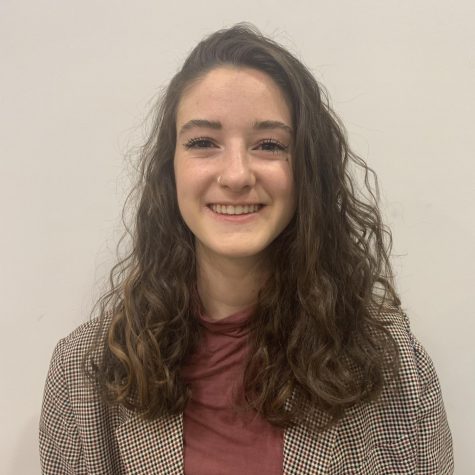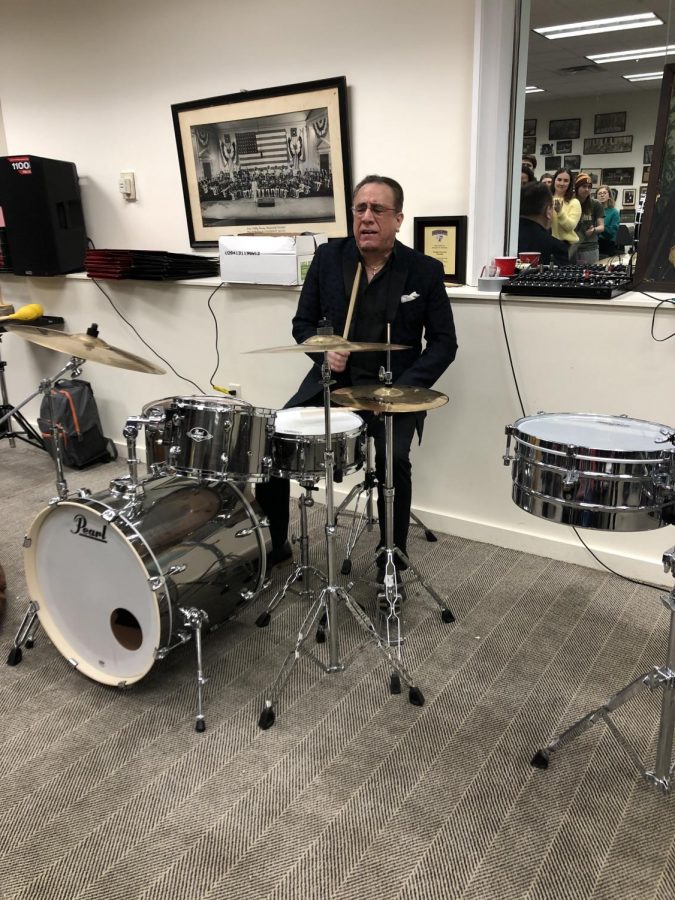Bobby Sanabria performs for Fordham Students
On Friday, Feb. 22, Bobby Sanabria, a seven-time Grammy-nominated drummer, percussionist, composer and Bronx Walk of Fame inductee performed for Fordham students on the second floor of McGinley.
The two-part event is part of a new series of collaborations between the Latin American and Latino Studies, Art History and Music departments.
Sarah Lehman, director of the Latin American and Latino American Studies department, Eric Bianchi, associate chair and director of Music, Nathan Lincoln-DeCusatis, assistant professor of music, and Mark Naison, a history professor at Fordham, organized the event. Sanabria’s visit included a morning lecture in the McGinley band room followed by a concert in the ballroom upstairs later in the day.
Sanabria is of Puerto Rican descent and was born and raised in the South Bronx, referring to himself as an “S.O.B,” or “son of the Bronx.” He said he credits his upbringing, defined in part by cultural conflict, planned shrinkage and the destruction of low-income housing brought about by Robert Moses and the Cross Bronx Expressway, as one of the inspirations for his music.
“I’m a product of all that,” he said during the morning lecture, and “this” – pointing to the array of congas, cymbals and a drum set — “this is what kept me alive.”
Sanabria expressed a big part of his childhood in his latest work, “West Side Story Reimagined.”
The album puts an Afro-Latin spin on Leonard Bernstein’s classic soundtrack and was nominated for a Grammy for Best Latin Jazz Album. During the lecture, Sanabria told the story of its conception. He described walking down the street in a predominantly Italian neighborhood and being yelled at for his Puerto Rican background. Later, he said he watched “West Side Story” at a Bronx theater with his parents. Sanabria said not only did he fall in love with the films music and themes of cultural transcendence but also thought, “Oh my god this is my life.”
Sanabria said the album allowed him to reclaim “West Side Story” and celebrate the contributions Latin American countries have made to modern music.
“Latin America has influenced all American music,” he said. “Listen to the ‘Rolling Stones,’ it’s there.”
When asked if recreating the soundtrack was a difficult task Sanabria responded “no.”
“That was an easy thing,” he said, “because the story is not told through lyrics, it is told through rhythm.”
The Fordham community was able to experience these lively rhythms later in the evening. Around 200 members of the Fordham community attended to hear Sanabria play with his band, “Bobby Sanabria & Ascensión.”
Sarah Lehman introduced Sanabria, reciting his impressive list of accolades.
“There’s so much more I could say but how about we let the music speak for itself?” she said.
Sanabria had faculty and students alike up and dancing, even providing a short merengue lesson to the crowd.
“Watch my hand—the thumb is the most important part of your hand,” he said. “When I wrap my thumb around her hand she knows ‘oh he’s going to pull me.’ — when I open my thumb like this [she knows] ‘he’s going to push me.’”
Sanabria said that he was a part of the last generation in the Bronx that really knew how to dance.
“I’m not talking about break-dancing,” he said. “How are you going to ask some lady, ‘hey would you like to spin on your head with me?’”
He said that dancing is more than a way to pass the time: its effects break barriers within the culture of the United States.
“[Dancing] is what broke the barriers between bigotry, racism, cultural insensitivity, all that stuff [and] negative energy,” he said.
Naison said that Sanabria’s performance brought light to the Bronx and university community.
“For one day at least, Bobby Sanabria turned Fordham into an extension of the Bronx,” he said. “Fear was replaced with joy, indifference was replaced with enlightenment, a new community was built and memories were created which may last a lifetime.”

Editor in Chief for Volume 103
Culture Editor for Volume 101, Volume 102.
Rachel Gow is a junior at Fordham College at Rose Hill, majoring in Journalism...







































































































































































































